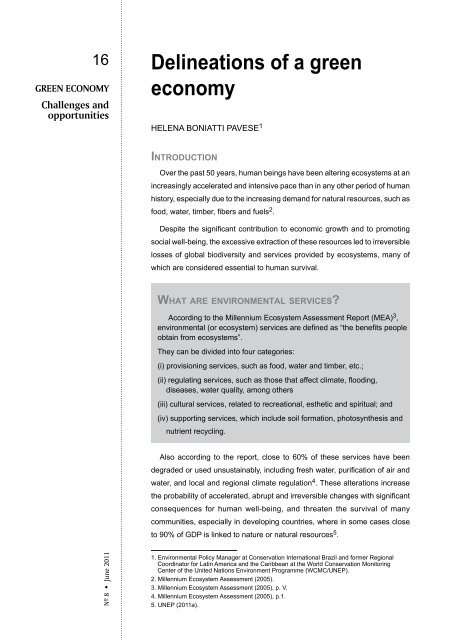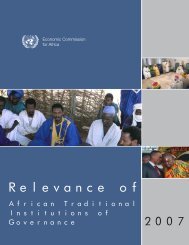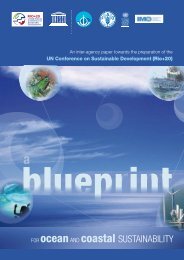Download Publication - Rio+20
Download Publication - Rio+20
Download Publication - Rio+20
You also want an ePaper? Increase the reach of your titles
YUMPU automatically turns print PDFs into web optimized ePapers that Google loves.
16<br />
GREEN ECONOMY<br />
Challenges and<br />
opportunities<br />
Delineations of a green<br />
economy<br />
Helena Boniatti Pavese 1<br />
In t r o d u c t io n<br />
Over the past 50 years, human beings have been altering ecosystems at an<br />
increasingly accelerated and intensive pace than in any other period of human<br />
history, especially due to the increasing demand for natural resources, such as<br />
food, water, timber, fibers and fuels 2 .<br />
Despite the significant contribution to economic growth and to promoting<br />
social well-being, the excessive extraction of these resources led to irreversible<br />
losses of global biodiversity and services provided by ecosystems, many of<br />
which are considered essential to human survival.<br />
Wh a t a r e e n v ir o n m e n t a l s e r v i c e s?<br />
According to the Millennium Ecosystem Assessment Report (MEA) 3 ,<br />
environmental (or ecosystem) services are defined as “the benefits people<br />
obtain from ecosystems”.<br />
They can be divided into four categories:<br />
(i) provisioning services, such as food, water and timber, etc.;<br />
(ii) regulating services, such as those that affect climate, flooding,<br />
diseases, water quality, among others<br />
(iii) cultural services, related to recreational, esthetic and spiritual; and<br />
(iv) supporting services, which include soil formation, photosynthesis and<br />
nutrient recycling.<br />
Also according to the report, close to 60% of these services have been<br />
degraded or used unsustainably, including fresh water, purification of air and<br />
water, and local and regional climate regulation 4 . These alterations increase<br />
the probability of accelerated, abrupt and irreversible changes with significant<br />
consequences for human well-being, and threaten the survival of many<br />
communities, especially in developing countries, where in some cases close<br />
to 90% of GDP is linked to nature or natural resources 5 .<br />
Nº 8 • June 2011<br />
1. Environmental Policy Manager at Conservation International Brazil and former Regional<br />
Coordinator for Latin America and the Caribbean at the World Conservation Monitoring<br />
Center of the United Nations Environment Programme (WCMC/UNEP).<br />
2. Millennium Ecosystem Assessment (2005).<br />
3. Millennium Ecosystem Assessment (2005), p. V.<br />
4. Millennium Ecosystem Assessment (2005), p.1.<br />
5. UNEP (2011a).

















